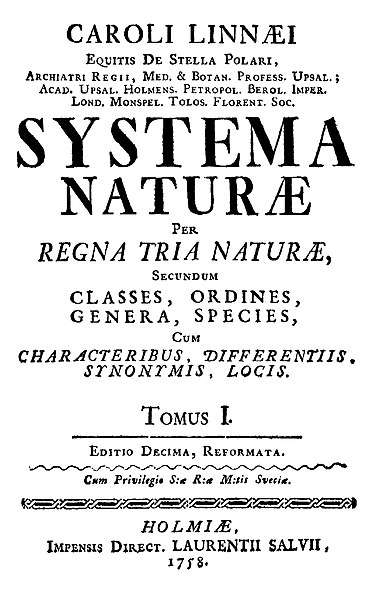Systema Naturae is one of the major works of the Swedish botanist, zoologist and physician Carl Linnaeus (1707–1778) and introduced the Linnaean taxonomy. Although the system, now known as binomial nomenclature, was partially developed by the Bauhin brothers, Gaspard and Johann, Linnaeus was first to use it consistently throughout his book. The first edition was published in 1735. The full title of the 10th edition (1758), which was the most important one, was Systema naturæ per regna tria naturæ, secundum classes, ordines, genera, species, cum characteribus, differentiis, synonymis, locis, which appeared in English in 1806 with the title: "A General System of Nature, Through the Three Grand Kingdoms of Animals, Vegetables, and Minerals, Systematically Divided Into their Several Classes, Orders, Genera, Species, and Varieties, with their Habitations, Manners, Economy, Structure and Pecularities".
Title page of the 1758 edition of Linnaeus's Systema Naturæ
Key to the Sexual System from the 10th (1758) edition of Systema Naturæ
Carl Linnaeus, also known after ennoblement in 1761 as Carl von Linné, was a Swedish biologist and physician who formalised binomial nomenclature, the modern system of naming organisms. He is known as the "father of modern taxonomy". Many of his writings were in Latin; his name is rendered in Latin as Carolus Linnæus and, after his 1761 ennoblement, as Carolus a Linné.
Carl von Linné by Alexander Roslin, 1775 (oil on canvas, Gripsholm Castle)
Birthplace at Råshult
Statue as a university student in Lund, by Ansgar Almquist
Pollination depicted in Praeludia Sponsaliorum Plantarum (1729)






